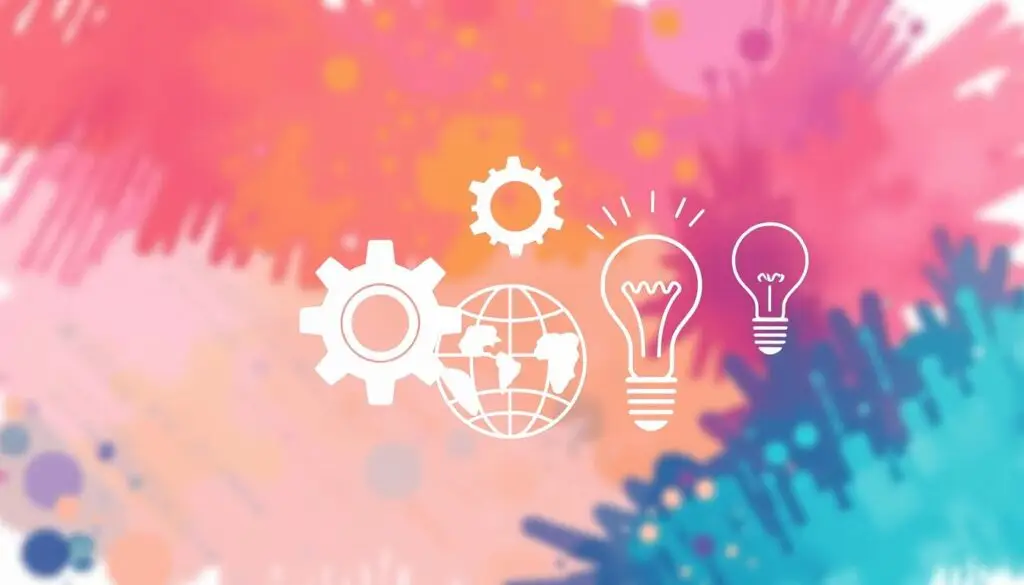In today’s fast-changing world, having the right skills can be a game-changer. The top 5 best skills are key for personal growth and success in our lives. By learning these essential abilities, we open doors to new opportunities and set ourselves up for lasting success.
Key Takeaways
- Discover the top 5 best skills in the world that can transform your life
- Understand the importance of developing essential abilities for personal and professional success
- Learn how to cultivate these core skills to unlock a world of opportunities
- Enhance your personal development and career growth by mastering these key abilities
- Explore the interconnectedness of these top skills and how to leverage them for long-term fulfillment
Mastering Communication: The Art of Connecting
Effective communication is key in both personal and professional life. It helps you build strong relationships and share your ideas clearly. This section will cover verbal and non-verbal communication, and the importance of active listening.
Verbal and Non-Verbal Communication Techniques
Verbal communication uses words, tone, and pitch. To improve, speak clearly and use the right words. Non-verbal communication includes body language and facial expressions. Make sure your body language matches what you’re saying.
Active Listening for Better Understanding
Active listening is vital for good communication. It shows you care and helps you understand others better. Try paraphrasing, asking questions, and giving feedback to get the message right.
| Communication Skill | Importance | Key Strategies |
|---|---|---|
| Verbal Communication | Conveys your message clearly and effectively |
|
| Non-Verbal Communication | Reinforces your message and builds rapport |
|
| Active Listening | Demonstrates understanding and fosters connection |
|
Mastering these communication skills will help you connect better with others. You’ll handle complex situations easily and reach your goals.
“The single biggest problem in communication is the illusion that it has taken place.” – George Bernard Shaw
Critical Thinking: Unlocking the Power of Reason
In today’s world, being able to think critically is essential. It’s not just a skill; it’s a must-have. Critical thinking helps us solve problems and make decisions with confidence.
At the core of critical thinking is the ability to ask the right questions, evaluate evidence, and draw logical conclusions. These skills help us find hidden patterns, spot biases, and make smart choices.
Critical thinking is about more than just one skill. It involves:
- Analytical skills: Breaking down information, finding key points, and seeing how they connect.
- Problem-solving: Tackling challenges step by step, thinking from different angles, and finding new solutions.
- Decision-making: Weighing the good and bad, thinking about what might happen, and choosing wisely.
“The essence of the independent mind lies not in what it thinks, but in how it thinks.”
– Christopher Hitchens
By improving our critical thinking, we can use reason to tackle the fast-changing world. This skill lets us make smart choices, solve tough problems, and face new challenges with creativity and strength.
In our fast-paced world, mastering critical thinking is key to success. It opens doors to personal and professional growth. By embracing this skill, we can build a future where reason and logic lead to a better life.
Emotional Intelligence: The Key to Self-Awareness
In today’s fast world, emotional intelligence is key for success. It helps us understand ourselves better and connect with others. This skill is vital for personal and work life.
Understanding and Managing Emotions
At the heart of emotional intelligence is knowing and understanding our feelings. This self-awareness lets us handle our emotions well. It helps us deal with tough times and keep our personal and work lives balanced.
Developing Empathy and Social Skills
Being able to feel and understand others’ feelings is also part of emotional intelligence. This skill helps us build strong relationships and handle social situations smoothly. It also makes us better at talking, working together, and making lasting connections.
“Emotional intelligence is the ability to recognize and understand emotions in yourself and others, and to use this awareness to manage your behavior and relationships.”
Learning emotional intelligence changes us for the better. It helps us grow, succeed in our careers, and have better relationships. By improving self-awareness, managing emotions, showing empathy, and enhancing social skills, we can reach our full potential.
Top 5 BEST SKILLS IN THE WORLD
In today’s fast-changing world, the most valuable skills go beyond just technical skills. The top 5 best skills are crucial for success and ongoing lifelong learning and growth.
The Importance of Lifelong Learning
Having a growth mindset and being able to adapt is key. It keeps you resilient and ready for the modern world’s challenges. Adaptability is essential because the skills needed today might change a lot in the future.
Investing in your personal development through continuous learning is vital. It’s about mastering new tech, improving communication, or boosting critical thinking. A lifelong learning commitment will benefit your career and personal life greatly.
Adapting to Change and Embracing Growth
In our fast-changing world, the skill to adapt to change is vital. People and organizations that can quickly adapt, learn new skills, and adopt new ideas succeed. By having a growth mindset, you’ll be ready to face the future’s uncertainties and seize new chances.
The top 5 best skills are not just tools for success. They are a journey to ongoing growth, happiness, and flexibility. By embracing lifelong learning and being open to change, you’ll thrive in the 21st century’s dynamic landscape.

“The only way to keep up with the pace of change is to keep learning.”
Problem-Solving: Navigating Life’s Challenges
In our fast-paced world, solving problems is key. We need to think analytically and make good decisions. This helps us face challenges in our personal and work lives.
Analytical Thinking and Decision-Making
Good problem-solving starts with a sharp analytical mind. We break down big issues into smaller parts. Then, we look at all the facts and find the main problem.
Once we know the problem, we can find solutions. We weigh each option’s good and bad sides. This way, we make smart choices that solve problems for good.
- Use a methodical approach to solving problems, learning from past experiences and the best practices in your field.
- Work on your critical thinking, questioning assumptions and looking at things from different angles to find new solutions.
- Always be open to learning and growing, ready to tackle new challenges as they come.
| Analytical Thinking Strategies | Decision-Making Techniques |
|---|---|
|
|
By improving our analytical thinking and decision-making, we can tackle life’s problems with confidence. We become more resilient and focused on finding solutions.
“The secret of getting ahead is getting started. The secret of getting started is breaking your complex overwhelming tasks into small manageable tasks, and then starting on the first one.”
– Mark Twain
Leadership and Teamwork: Inspiring Collaboration
Being a good leader and team player are key to success. By improving your leadership and teamwork, you can inspire others. You’ll reach shared goals and make a difference in your community.
Good leaders communicate well, delegate tasks, and motivate their team. Strong interpersonal skills help build trust and solve problems. They make the team feel united.
Teamwork means working together towards a goal. When everyone brings their skills, they can do more together. Teamwork needs listening, compromise, and teamwork.
“The strength of the team is each individual member. The strength of each member is the team.” – Phil Jackson
By improving leadership and teamwork, you can motivate others. This mix helps you reach your goals and creates a supportive environment. It encourages respect, innovation, and growth.
| Key Attributes of Effective Leaders | Characteristics of Successful Teamwork |
|---|---|
|
|

Mastering leadership and teamwork prepares you for big challenges. It drives innovation and makes a lasting impact in your life.
Time Management: Mastering Productivity
In today’s fast world, time management is key to reaching your best. By learning to prioritize and set goals, you boost your productivity. This helps you balance work and life better.
Prioritization and Goal-Setting Strategies
First, figure out what tasks are most important. Use the Eisenhower Matrix to sort tasks into four groups. Focus on the urgent and important ones, and delegate or drop the rest.
Then, set SMART goals to guide your success. Break big goals into smaller steps. This keeps you motivated and on track.
Work-Life Balance and Self-Care
Keeping a good work-life balance is vital for lasting productivity and happiness. Make time for self-care like exercise, healthy food, and mindfulness. Set clear lines between work and personal life. Say no to tasks that waste your energy.
“The key is not to prioritize what’s on your schedule, but to schedule your priorities.” – Stephen Covey
Mastering time management lets you reach your goals, live a healthy life, and enjoy everything. It’s all about balance and focus.
Creativity and Innovation: Thinking Outside the Box
Being creative and innovative can take you far in life. It opens doors to new opportunities and success. By thinking differently and finding unique solutions, you can grow and achieve more.
Creativity leads to big changes in our world. It helps you find new ways to solve problems. Critical thinking and problem-solving skills help you see things in new ways.
- Foster a Curious Mindset: Keep a sense of wonder and seek out new experiences.
- Experiment and Take Calculated Risks: Don’t be afraid to try new things. Even failures can lead to success.
- Collaborate and Seek Diverse Perspectives: Work with people from different backgrounds. They can bring fresh ideas.
- Embrace Lifelong Learning: Always be curious and keep learning. The more you know, the more you can create.
By focusing on creativity and innovation, you can think differently and find new ideas. This can change your life for the better. Unlock your full potential and start solving problems in new ways.
| Skill | Description | Importance |
|---|---|---|
| Creativity | The ability to generate original and unique ideas. | Crucial for problem-solving, innovation, and personal growth. |
| Innovation | The implementation of creative ideas to produce novel solutions. | Drives progress, competitiveness, and adaptation to change. |
| Critical Thinking | The ability to analyze information, evaluate options, and make informed decisions. | Essential for effective problem-solving and decision-making. |
| Problem-Solving | The process of identifying and resolving complex issues. | Fundamental to personal and professional success. |
“Creativity is intelligence having fun.” – Albert Einstein
Resilience and Adaptability: Thriving in Uncertainty
In today’s changing world, resilience and adaptability are key. They help you not just survive, but thrive when things are uncertain. Building mental fortitude and grit prepares you to face challenges, recover from setbacks, and keep growing.
Resilience lets you bounce back from tough times. It’s about having the strength to keep going, even when things get hard. Adaptability, meanwhile, is about adjusting well to new situations. Together, these skills help you handle life’s ups and downs with ease and determination.
Building Mental Fortitude and Grit
It’s important to develop mental fortitude and grit for resilience and adaptability. Mental fortitude is about staying tough when faced with hard times. Grit is about having the drive and persistence to reach your long-term goals.
- Practice mindfulness and meditation to find calm and clarity.
- See challenges as chances to learn and grow.
- Stay active to build both physical and mental strength.
- Surround yourself with people who support and guide you.
By improving these skills, you’ll be ready to face life’s unknowns and come out stronger. Resilience and adaptability unlock your true potential and help you thrive in a world that’s always changing.
“The greatest glory in living lies not in never falling, but in rising every time we fall.” – Nelson Mandela
Networking and Relationship Building: Fostering Connections
In the fast-paced world of work, networking and relationship building are key. They can boost your success. By building a wide network of real connections, you unlock many opportunities and resources. These can greatly improve your personal and professional development.
Good networking is more than just handing out business cards or going to events. It’s about making real connections, listening well, and building trust. Having strong interpersonal skills helps you talk easily, find common interests, and connect with people.
- Go to local meetups, conferences, or industry events to grow your network.
- Listen actively and ask smart questions to get to know others’ needs and interests.
- Give value and help to your connections, like sharing knowledge, making introductions, or offering help.
- Stay in touch with new contacts and keep working on the relationships over time.
Relationship building also means making personal connections that make your life better. By building real bonds with family, friends, and mentors, you gain a wide range of views, experiences, and knowledge. This can help you grow and make better choices.
“Your network is your net worth.” – Porter Gale
Investing in your networking and relationship building skills opens up new doors. It lets you access valuable resources and build a sense of community and belonging. Learn to connect well, and you’ll see your personal and work life grow in exciting ways.
Conclusion
Mastering the top 5 best skills can change your life. These skills include effective communication, critical thinking, emotional intelligence, problem-solving, and creativity. By improving these areas, you set yourself up for success and personal growth.
Developing these skills opens up new possibilities. They help you in your career and in everyday life. You’ll build stronger relationships and adapt better to change.
Start a lifelong journey of learning and growth. Stay open and resilient when faced with challenges. This way, you’ll not only enhance your life but also the lives of those around you. The skills you learn are the key to a fulfilling and successful future.

